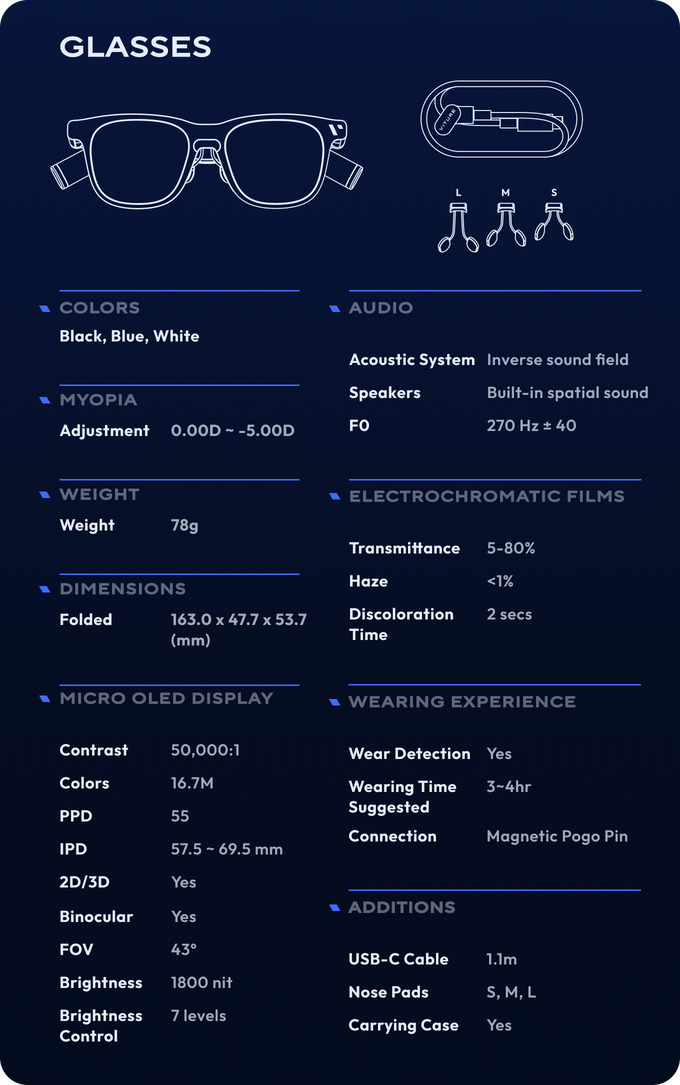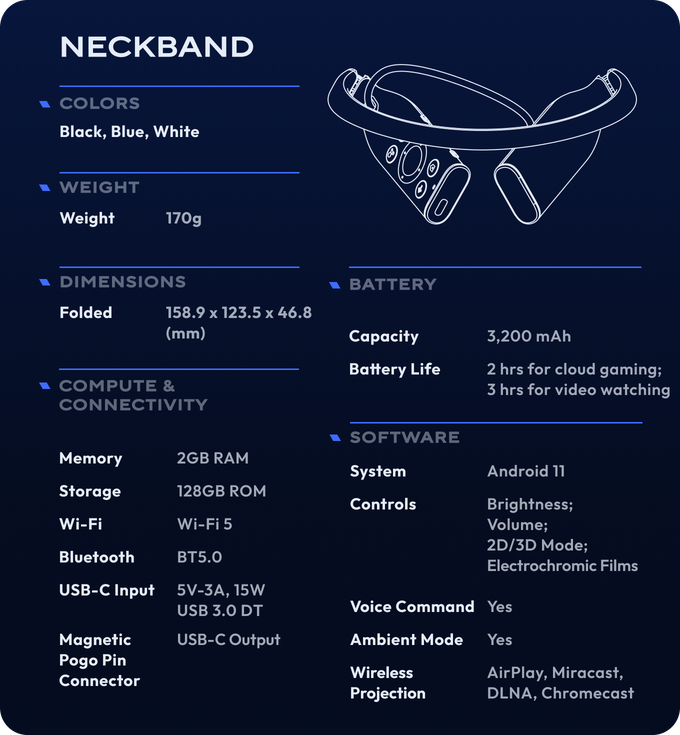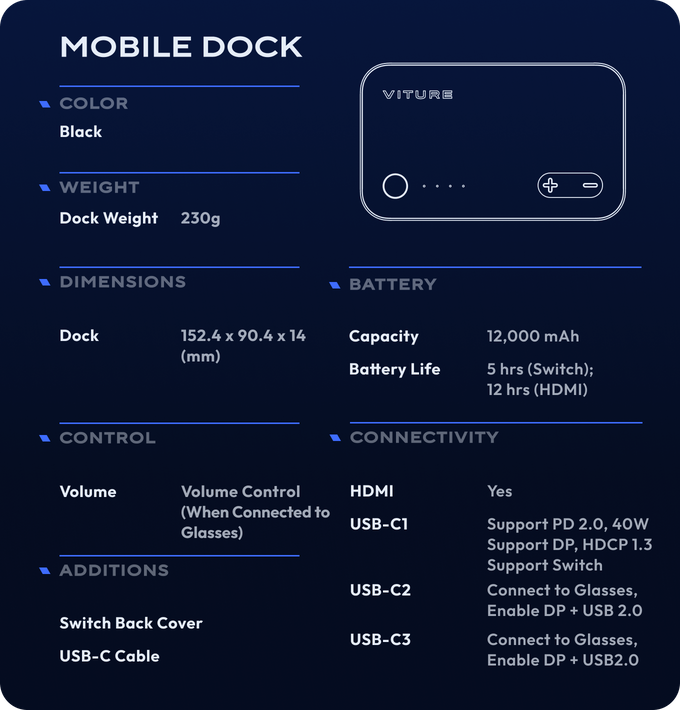Crowdfunded Viture One XR Glasses Promise Portable Gaming, Streaming
Wireless neckband add-on makes this the perfect 'Steam Neck'
Get Tom's Hardware's best news and in-depth reviews, straight to your inbox.
You are now subscribed
Your newsletter sign-up was successful
As you settle back on the 5:40 pm train waiting to get home, there's a single thought on your mind: beating Elden Ring's Malenia, Blade of Miquella boss. You've been keeping her move set in the back of your mind all day — details stewing amongst work emails and calls as you recall the telltale signs of her attacks and contemplate the timing needed for a perfect dodge.
There's just one issue: By the time you get home, you'll only have about thirty minutes left to try and vorpal Malenia out of existence before life and responsibilities put you back in your place. "There must be a better way to use my hour-and-a-half commute", you think. But you don't want to force yourself to game on a 7-inch Steam Deck — you want the all-encompassing experience of a 120-inch TV, where you can shut out the world and actually focus on "floating like a butterfly" against Malenia's onslaught.
Did that narrative elicit a glimpse of hope in your eyes? You're not alone — 4,280 people pledged over $2.6 million on Kickstarter for the Viture One XR goggles, blowing the company's modest $20,000 starting goal out of the water in a matter of hours. To put this into perspective, the original Kickstarter for the Oculus Rift raised $2,437,429.
The Viture One promises to put a 120-inch, 1080p, 60 Hz display front and center. That's not much compared to the current best VR headsets out there, especially when you take into account the comparably-limited 43º field of view (FOV) allowed by the Viture One glasses, while the 1,800 nit capability will certainly come in handy in less obscure environments. But this isn't a VR headset, so don't let the limited FOV lock you up.



Part of the interest in the Viture One stems from the goggles themselves. The glasses weigh just 77 grams and feature an embedded directional speaker (for privacy), a control pad, color-changing film that dims or brightens (5% to 80% transparency) content based on viewing conditions, and prescription lens options. The glasses can be connected to any USB-C device that has video output and power delivery — this includes the Steam Deck, many Android phones, and compatible laptops and desktops. There's even an optional dock that lets you connect to HDMI-bound devices, such as game consoles, and ensures sustained power delivery.
The most interesting aspect of the Viture One may not be the glasses but the optional neckband, which adds wireless connectivity. The neckband weighs 170 grams and has a 3200MAh battery, and features 5G and Wi-Fi connectivity, 2GB of RAM, and 128GB of ROM, which allows for a full-fledged app ecosystem for content consumption.
The Viture One aims to be the "Steam Neck" of gaming through its support for cloud gaming apps (such as Microsoft's xCloud, Nvidia's GeForce Now, and also lesser-known cloud gaming options from Parsec, Shadow, and Boosteroid). For those who aren't interested in cloud gaming, the neckband also lets you install streaming apps (and your own games gallery) through Steam Link, Sony's PSPlay, Rainway, and AMD Link.
Get Tom's Hardware's best news and in-depth reviews, straight to your inbox.
The Viture One also supports popular streaming apps such as Netflix, Disney+, AppleTV+, and — wait for it — 3D movies via Vudu and Plex integration.
Viture expects to start shipping the Viture One in October or November of this year, so backers shouldn't have to wait too long. The Viture One XR glasses alone cost $429 (early bird)/$479 on Kickstarter and will retail for $549. If you want accessories, the glasses-and-dock combo costs $529 (early bird)/$579, as does the glasses-and-neckband combo — both combos will retail for $678. The glasses with both accessories costs $629 (early bird)/$679 and will retail for $807. The most popular packages seem to be the glasses-and-neckband combo and the "ultimate" glasses and both accessories combo; both have just four early bird slots left at the time of this writing.
Always remember: Backing a Kickstarter project isn't the same as buying a product. It's an investment, and there are many ways Kickstarter projects can fail to deliver as promised (or even fail to deliver at all). But with over $2.6 million in funding, we hope the Viture One will deliver.

Francisco Pires is a freelance news writer for Tom's Hardware with a soft side for quantum computing.
-
-Fran- This is actually a cool concept for sure. I'd love to see the final product and give it a test. This is definitely a great way to have decent-ish quality monitors on the go.Reply
Regards. -
KyaraM The concept is quite interesting, if yet again not suited to people wearing glasses I wager.Reply
However, I'm a bit on the fence about the price point. Only $20, 000? For a project like this? That is super low, which, looking at kickstarter, makes me immediately suspicious. There are more than enough scammers on that site, sadly. -
edzieba We're back to the days of PMDs (Personal Media Displays) that pretend to be VR HMDs, just like before the Rift DK1. No tracking, tiny FoV, latency bad enough not to even list. Functionally, this is very similar to the 2012 ST1080 (a small FoV 1080p PMD).Reply
This particular device looks very, very similar to the TCL NxtWear Air, so probably both come from the same OEM. -
cryoburner Reply
Yeah, that was my first thought. This doesn't seem to offer any of the best parts of virtual reality or augmented reality, but is little more than a screen fixed in front of your face. Unlike VR, there's no head-tracking, and unlike AR, there's no interaction between what's on-screen and the outside environment. It's a lot like a modernized version of devices from companies like Vuzix being sold back around 2005. And even they launched a VR version with dodgy tracking back in 2007...edzieba said:We're back to the days of PMDs (Personal Media Displays) that pretend to be VR HMDs, just like before the Rift DK1. No tracking, tiny FoV, latency bad enough not to even list. Functionally, this is very similar to the 2012 ST1080 (a small FoV 1080p PMD).
This particular device looks very, very similar to the TCL NxtWear Air, so probably both come from the same OEM.
https://www.techpowerup.com/40081/vuzix-iwear-vr920-worlds-first-fully-immersive-virtual-reality-video-eyewear
It's surprising how many people still jump on mediocre kickstarting campaigns with no guarantee of actually receiving a product rather than just waiting until the product is available and seeing whether its something even worth considering. If these guys only claim to have required $20,000 (the cost of fewer than 40 of these units) to bring the product to market, then they didn't actually need crowdfunding to make it happen, and it's simply being used as a marketing tool. -
edzieba Reply
Among all the issues with this kickstarter campaign, that specifically is not a problem: it's basically a pre-order campaign with a minimum required unit presale before production (because you generally know in advance how many units you'd need to sell at a given RRP in order to break-even on manufacturing setup costs, which can be considerable and may even be more than R&D costs), but with a third party added in to ensure consumers are not out of pocket if that MOQ is not met - a 'traditional' campaign where the company takes pre-orders directly can silently fail if the MOQ is not met (or even published), but by that time the company already has your money.cryoburner said:If these guys only claim to have required $20,000 (the cost of fewer than 40 of these units) to bring the product to market, then they didn't actually need crowdfunding to make it happen, and it's simply being used as a marketing tool.
Companies can still sandbag their minimum kickstarter amount and set it far too low to guarantee production a marginal 'success' though, which is why you often see campaigns that meet their target, but cancel before actually completing (because their target was too low and they hoped inertia would carry them over the actual target), or worse companies that try and bull onwards after the campaign falls short in the hope outside investment will supply the shortfall - or even that the kickstarter success will act as proof of demand to attract investment - and fail before being able to deliver when they run out of cash. All of those issues also apply to 'real' kickstarters that seek R&D funding as well as manufacturing setup funding, so is not a unique issue to manufacturing setup kickstarters.
But as the whole point of kickstarter is to bet on a campaign success with no guarantees of any return, if you are not willing to gamble the cash you are backing with, you should not in any way ever consider backing any kickstarter ever. It is a pure wager, not an 'investment', an 'order', or anything similar. -
-Fran- I don't know why it's so important to give these so much functionality. Just a good pair of panels for good decent screen and that's it, no?Reply
Regards.
